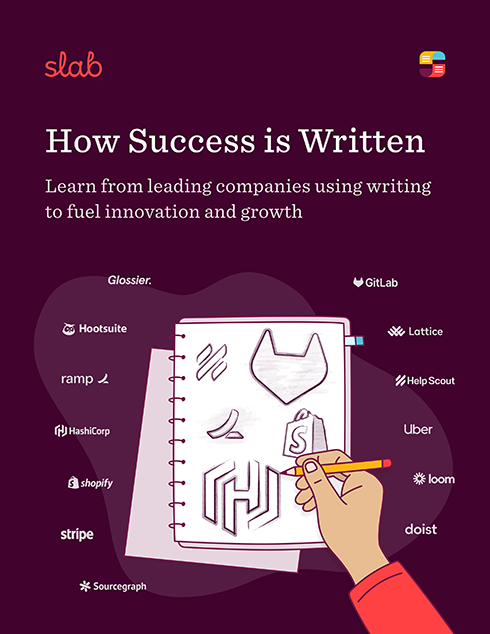How writing helps Doist's asynchronous setup soar
Their remote workforce puts writing first to democratize communication
For remote, global teams, asynchronous communication is a given—and learning how to master it is a must. Since its founding 11 years ago, Doist has been a remote-first asynchronous company. Doist started as a productivity app, Todoist, and launched it's second product Twist in 2017, an asynchronous communication tool. As Fadeke Adegbuyi, Doist’s Senior Marketing Manager of Content, tells it, “Relying on synchronous tools has never been an option for us.”
“When we say that we’re async first, what we mean is that we’re writing first.”
It’s no surprise that Doist has taken the problem of remote communication and turned it into a superpower. It’s a huge part of their culture, and as Fadeke says, it all boils down to believing in the power of writing to get aligned and achieve goals: “When we say that we’re async first, what we mean is that we’re writing first.”
Everything starts with writing
Because Doist relies so heavily on asynchronous communication, it's important that information is always accessible. In terms of deciding what needs to be written down, the criteria are pretty straightforward. “We approach communication from a beginner mindset,” says Fadeke. That means that the goal is to document answers to questions anyone might have who’s new to the company, a role, or a process. “Even if a process seems obvious or has been done many times before, we want to make sure everything’s in place so that someone who’s new to it gets it,” she says.
“Writing extends to everything we do—how we update one another on work, how information is passed down from our leadership team, how we brainstorm, and how we have discussions.” says Fadeke.
Streamlining the writing process
While writing has always been a big part of Doist’s culture, up until about a year ago, a lack of organization prevented the team from fully harnessing its power. According to Fadeke, “We had a lot of writing, but it was dispersed among many platforms. Some of it lived in Dropbox Paper, some was in Google Docs, some of it was in Twist threads. You would have to check in three to four different places to find what you needed, and there was also some duplication.” There was a strong need for a centralized location where each piece of documentation could live. Then, about a year ago, Doist took a page from the book of another company with a strong writing culture. Gitlab documents all their internal processes and knowledge in a company handbook and makes it available to the public.
In an effort to streamline communication and make their documentation more searchable, Doist has developed a handbook that’s housed in GitHub. The handbook includes everything anyone would need to know about working at Doist, and there are years of learning and transparency they can immediately draw upon. Whether it’s reading about the story of Doist, the company’s mission and values, revenue plans for the future, or HR practices and company policies, having access to this from day one lets people know what kind of journey to expect.
“Now, everything is searchable, which contributes to our culture of transparency. If anyone has a question, it’s likely that they’ll find a document for it.”
This initiative has strengthened Doist’s writing culture, and made it clear that having information documented in an accessible, centralized place makes employees more productive and strengthens company-wide transparency.
How writing has democratized Doist’s culture
Fadeke loves the way Doist prioritizes and relies on writing because she believes it makes employees more thoughtful about their work. “Allowing people to take the time to write out their thoughts gives them the opportunity to convey their ideas and express themselves in a way they wouldn’t be able to if they were just talking off-the-cuff,” she says. “People at Doist really have time to think through their ideas and make sure they’re communicating them in the most thoughtful way.”
“Having a culture that prioritizes writing is a great way to allow everyone to contribute more.”
Fadeke believes that having a writing-first culture democratizes communication at all levels. “Not everyone is extroverted, and some work cultures rely on people raising their hand and speaking up in meetings,” says Fadeke. “Having a culture that prioritizes writing is a great way to allow everyone to contribute more.”
Because Doist has always been remote, they've had found a lot of ways to build culture through writing. They do things like weekly Twist threads where people can share highlights from their weekend, or asynchronous, writing-based games of telephone. “Writing extends not just to how we work, but also how we play, and how we get to know one another,” says Fadeke.
The future will be well-documented
As for the next few years, Fadeke is confident that Doist’s writing culture will help the company continue to achieve its goals. “We have a wide range of team members from a range of countries, and being async enables us to maintain and grow that diversity,” she says.
“Other companies are stuck in a pattern where they confuse meetings with work, and that has to change.”
At this point, 80-90% of Doist’s communication is done asynchronously, and Fadeke sees this trend expanding in the future. “Writing is imperative to the sustainability of remote working culture,” she says. “Other companies are stuck in a pattern where they confuse meetings with work, and that has to change. Presence is easy to measure, but it’s detrimental to productivity.”
She predicts that as workplaces opt to stay remote indefinitely, a shift will occur. “Companies will start putting more trust in employees and allow them to communicate asynchronously,” she says. “We can rely on writing instead.” Doist has proven that operating this way isn’t just sustainable—it’s a superpower.

